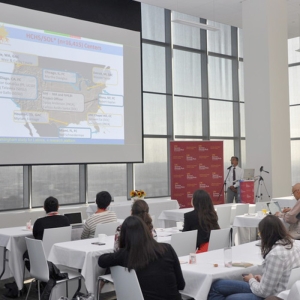International conference convenes leading experts on Latino health, aging and Alzheimer’s
October 27, 2017 / by Vincent Lim- Research
Over 100 attendees from the United States and Latin America—including elected members of the National Academies of Sciences, Engineering, and Medicine—came to USC to participate in what is considered the premier social research conference on Latino health and aging.
At the 2017 International Conference on Aging in the Americas (ICAA), which was hosted by the USC Edward R. Roybal Institute on Aging at the USC Suzanne Dworak-Peck School of Social Work, scholars discussed how the social and built environment affects the health and mental health of aging Latinos.
“We’re dedicated to developing new knowledge of Latino aging in the United States and Latin America and to establish leadership in the field,” said William Vega, the conference’s organizer, executive director of the USC Roybal Institute and elected member of the National Academy of Medicine.
U.S. Census data indicates that Latinos are the nation’s largest ethnic/racial minority group and the fast-growing segment of the U.S. older adult population.
Alzheimer’s and U.S. Latino subgroup differences
The conference brought together prominent researchers on Latino cognitive health, including Hector González, the principal investigator of the Study of Latinos – Investigation of Neurocognitive Aging (SOL-INCA), which is examining midlife risks for Alzheimer’s disease and related dementias among diverse, U.S.-based Latinos.
Wassim Tarraf, an assistant professor at Wayne State University and co-investigator on SOL-INCA, discussed findings that underscore the cognitive differences among Latino subgroups.
“Considering Latinos as one homogeneous group would not be a very good idea,” Tarraf said. “We have data to show that there are a lot of variations.”
Rates of cognitive impairment are higher among Dominicans and Puerto Ricans and lower among Mexicans, according to results from SOL-INCA.
“There may be something going on that’s biological or it may be socio-cultural factors,” González said.
Tarraf said reliable epidemiological data is important for research and developing policies that can meet the unique needs of different groups.
One of the aims of the SOL-INCA is to study differences in cognitive functioning among Latinos from various ethnic backgrounds.
Challenges in Latin America
The USC Roybal Institute began to establish closer ties with Cuban researchers last year after the Obama administration began normalizing relations between the United States and Cuba.
Jesús Menéndez Jiménez, a professor of geriatrics at the Medical University of Havana and the director of Cuba’s WHO Collaborating Centre in Public Health and Aging, noted that the growth rate of older adults in Cuba is one of the highest in Latin America and that the Cuban health care system is struggling to meet the needs of this increasing population.
“We will need to increase the efficiency and effectiveness of our services,” Jiménez said. “We still have much to improve.”
Mariana López-Ortega, a researcher from the Mexican National Institute of Geriatrics, spoke about the issues facing the rapidly aging population in Mexico.
“Life expectancy at age 60 is 22 years, but 12 of those years will be lived with disability,” López-Ortega said. “Mexico as a whole lacks well-developed and funded health and social care systems that could respond to these increasing and differentiated demands. At the same time, the provision of care for older adults currently relies mostly on the family.”
Emerging scholars
A major goal of the conference is to help young scholars in the early stages of their research careers by connecting them with senior researchers who have conducted groundbreaking work in the field.
At this year’s conference, a record 26 emerging scholars attended and presented their work.
The conference series on aging in the Americas was established in 2001 at the Lyndon B. Johnson School of Public Affairs at The University of Texas at Austin by principal investigator Jacqueline Angel, professor of public affairs and sociology.
The event is in its 9th installment and was held in September to coincide with National Hispanic Heritage Month. This is the second time the USC Roybal Institute hosted the conference. It previously hosted the 2012 ICAA.
The conference series continues to be funded by the National Institute on Aging.
Sponsors of this year’s conference included the USC Suzanne Dworak-Peck School of Social Work, AARP California, AARP Texas, Dignity Health – St. Mary Medical Center, L.A. Care Health Plan, Los Angeles Foundation on Aging and The California Endowment.
To reference the work of our faculty online, we ask that you directly quote their work where possible and attribute it to "FACULTY NAME, a professor in the USC Suzanne Dworak-Peck School of Social Work” (LINK: https://dworakpeck.usc.edu)
